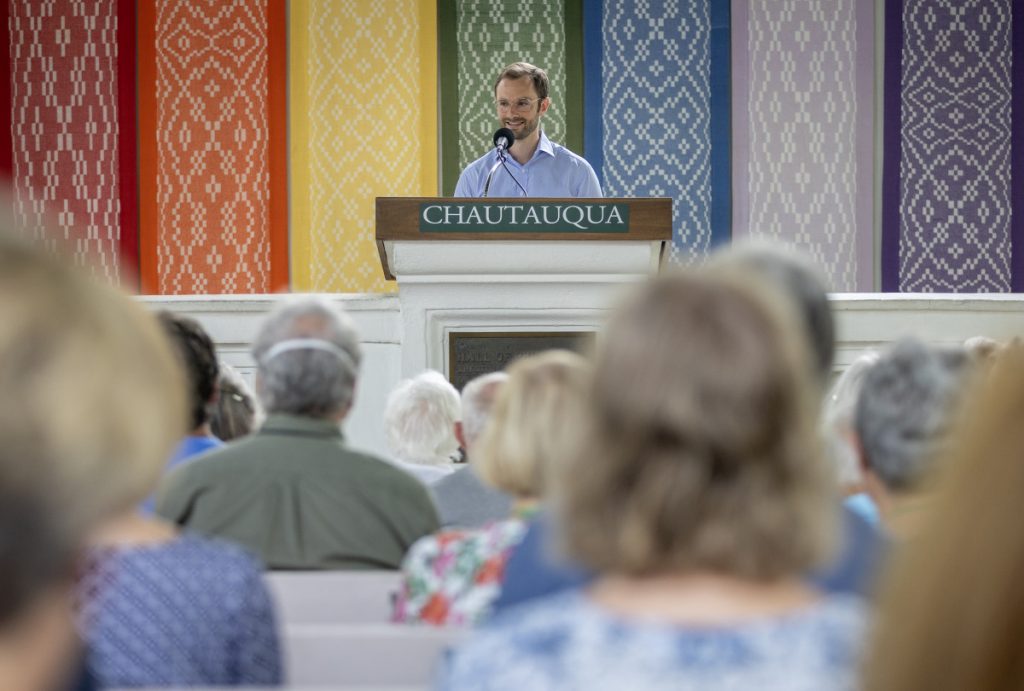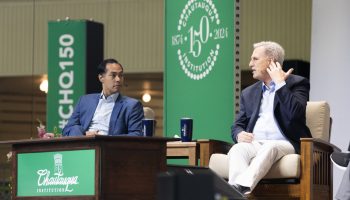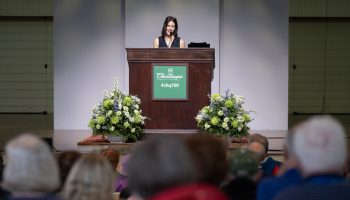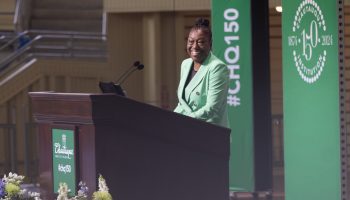
Sara Toth
Editor
Some years ago, at the end of the semester, Adam Sandel’s students asked him a question: How has philosophy changed the way you live?
He paused, thought about it, and gave a textbook answer: Philosophy can help someone develop an independent mind. It can help challenge conventional wisdom. It can help someone assess what they might have taken for granted. Then he thought a little bit more.
“I came to an answer that I think it’s better actually because it’s a little bit more concrete,” he said. “And that’s that philosophy has taught me the significance of friendship.”
That confused his students, who had spent much of their studies reading philosophy texts that spoke to issues of justice, and little about friendship. But Aristotle, Sandel told them, did write about friendship; it’s a virtue, the great philosopher posited, and one of the most necessary aspects of life.
This was Sandel’s springboard for his presentation at 2 p.m. Friday in the Hall of — appropriately — Philosophy as he closed the Interfaith Lecture Series Week One theme: “Holy Friendship: Source of Strength and Challenge.” With his lecture, “What Friendship Really Means,” Sandel drew a distinction: The meaning of friendship lies in the difference between a friend and an ally.
“Allies are good. They’re important. They keep our lives moving the world moving. But they’re not friends necessarily not friends in the genuine sense,” said Sandel, who is the author of Happiness in Action: A Philosopher’s Guide to the Good Life and an assistant district attorney in Brooklyn, New York. “Friendship in the genuine sense, I think, is friendship that has to do with more than just a goal. More than just an accomplishment. A friend is someone who helps you put your goals in perspective. When you fail, who helps you see the bigger picture? Who helps you see that?”
Amidst the incoherence and messiness of life, a friend can help interpret your story, return you to a sense of self. A friendship has a shared history of mutual commitment; allies, on the other hand, can materialize with the shake of a hand, and dissolve with the accomplishment of a goal.
“Friendship, by contrast, has a very different temporal structure. We all know it takes a while to make real friends. You can’t just make your friend instantly,” he said. “There really is no such thing as love at first sight when it comes to friendship.”
But once a friendship — a true friendship — develops, it reaches out “almost infinitely into the future.”
Sandel made another distinction, essential for understanding happiness and a good life: there’s activities to do for the sake of a goal, and there’s activities to do for the sake of the activities themselves.
“Friendship is one of the most very powerful forms of activity for the sake of itself. Think of a moment when you were fully immersed in what you were doing intensely joyfully,” Sandel said. “Chances are you were with friends or family; for the purposes here, it’s the same idea.”
Sandel suggests that friendship for the sake of itself is a “way of being together that involves understanding,” he said. That’s an important point, since one of the “philosophical knocks against friendship is that friendship is actually a kind of sentimental, emotional relationship only, and that we make friends (only to) become habituated to sharing the sorrows and pains and pleasures of the people who are closest to us.”
Sandel cited philosopher-economist Adam Smith, who criticized friendship as antithetical to reason, and then pushed back against the 18th-century thinker.
“Friendship involves each understanding and dialogue,” he said. “Friendship is a form of understanding — understanding each other and understanding something, some activity or some situation. Those … are always at play in friendship, and friendship in the most genuine sense and the friendship that is conducive to happiness.”
Much of philosophy considers the nature of self-possession, and it’s often thought that “being strong and powerful or self-possessed individual is different from being a good friend,” Sandel said. “But I think the two go together, and I think it’s important to consider friendship as a way in which we come to understand ourselves.”
Even when we consider solitary acts — bold ones of self-possession, self-confidence,” friendships are “lurking in the background,” Sandel said. Think about pep talks, and the imagination of talking to yourself as you would have a friend talk to you.
“Actually the friend is there; at least, the potential friend is there. You just don’t see him,” Sandel said. “It’s very important to look at that to understand the depth of friendship in our lives. One can be a friend himself or herself. … Friendship and self-possession can go together.”
There’s a reason that Enlightenment philosophy says comparatively little about friendship — that school of thought tended to view how history developed, and was developing.
“The world is moving in a direction that is absolutely more prosperous, more just more technologically advanced than in past times. The very term ‘enlightenment’ captures that self-understanding,” he said. “If you ascribe to that worldview, a kind of linear understanding of progress, … friendship tends to take a backseat to alliances.”
This stands in contrast to the Greek thinking of friendship, which existed in a world “written with tragedy rather than progress,” Sandel said. Thus, “friendship rises to immense significance because friendship is what allows us to keep going to redeem ourselves to redeem life when things go terribly wrong.”
What previous schools of philosophy missed, Sandel argued, is the ability of friendship to help us understand ourselves and understand each other; reason and justice can’t be learned in the abstract, which is why friendship is so important.
Finally, Sandel said, friendship helps us understand our experience of time, and the passage of time. The future is “the moment lying ahead,” the goal to be accomplished; the present is us “working feverishly” to accomplish that goal; maybe the past is an accomplishment, already “fading into oblivion.” Or maybe it’s a failure.
“We have no moment that lasts,” Sandel said. “Everything that approaches fades away.” Here is where friendship comes in.
“Think back to that basic expression of commitment: No matter what happens, I’ll stand by your side,” he said.
To say that with conviction, one must have a strong sense of the past; that past animates the “here and now, a past that’s very much active.” Friends can be that grounding for each other, and help each other navigate a “future that’s utterly unknowable, unforeseeable, unfathomable, mysterious.”
“The meaning and weight of the commitment (between friends) surely depends on a future that’s radically open ended,” Sandel said. “And not just the future of goal-oriented striving to achieve this kind of fullness to time and possibility in every moment — this what friendship in the highest sense does for us. Coming to that understanding of time and living in the spirit of such an understanding, I think is essential to finding a happiness that lasts.”




